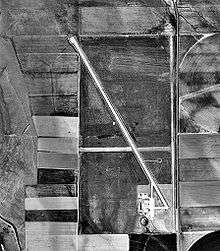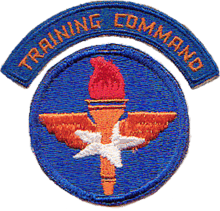Fort Morgan Municipal Airport
Fort Morgan Municipal Airport (ICAO: KFMM, FAA LID: FMM, formerly 3V4)[2] is six miles north of Fort Morgan, in Morgan County, Colorado.[1] The airport is in the city limits in a detached section of the city. The National Plan of Integrated Airport Systems for 2011–2015 categorized it as a general aviation facility.[3]
Fort Morgan Municipal Airport | |||||||||||||||||||
|---|---|---|---|---|---|---|---|---|---|---|---|---|---|---|---|---|---|---|---|
 USGS 1998 orthophoto | |||||||||||||||||||
| Summary | |||||||||||||||||||
| Airport type | Public | ||||||||||||||||||
| Owner | City of Fort Morgan | ||||||||||||||||||
| Serves | Fort Morgan, Colorado | ||||||||||||||||||
| Elevation AMSL | 4,569 ft / 1,393 m | ||||||||||||||||||
| Coordinates | 40°20′02″N 103°48′15″W | ||||||||||||||||||
| Website | CityOfFortMorgan.com/... | ||||||||||||||||||
| Map | |||||||||||||||||||
 FMM Location in Colorado | |||||||||||||||||||
| Runways | |||||||||||||||||||
| |||||||||||||||||||
| Statistics (2011) | |||||||||||||||||||
| |||||||||||||||||||
Many U.S. airports use the same three-letter location identifier for the FAA and IATA, but this airport is FMM to the FAA[1] and has no IATA code (Memmingen Airport in Memmingen, Germany has IATA code FMM).
Facilities
The airport covers 324 acres (131 ha) at an elevation of 4,569 feet (1,393 m). It has three runways: 14/32 is 5,219 by 60 feet (1,591 x 18 m) concrete; 17/35 is 3,800 by 30 feet (1,158 x 9 m) dirt/turf; 8/26 is 2,467 by 100 feet (752 x 30 m) turf.[1]
In 2011 the airport had 9,543 aircraft operations, average 26 per day: 90% general aviation, 8% air taxi, and 2% military. 23 aircraft were then based at this airport: 96% single-engine and 4% multi-engine.[1]
History
The Fort Morgan Municipal Airport was dedicated in 1933 as Young Municipal Field. Agriculture was the mainstay of the community, and the crop spraying and dusting business became the focus of the Airport.[4] In April 1940, the airport was leased by the United States Army Air Corps as part of the military buildup prior to World War II. It was used by the Air Corps as a glider pilot training school.
The glider school was operated under contract by Plains Airways, Inc, it was under the general supervision of the 1st Glider Training Detachment, 36th Flying Training Wing, Western Flying Training Command.[5] Training was conducted using Taylorcraft TG-6A and Aeronca TG-5 combat training gliders, towed by C-47 Skytrain aircraft.[6] An all-way turf airfield with a 5,200' x 5,200' landing/takeoff area was used for flight operations.
The flight cadets consisted of both experienced sailplane pilots and others who had washed out of conventional pilot training and were given a second chance to fly, The possibility of officer's pay and the chance to fly attracted a particular breed of risk-tolerant trainees. Trainees were given instruction on how to follow a tow plane and fly the unpowered aircraft to the designated landing zone.[7]
Unlike powered pilots, combat training was also provided, as once a pilot committed to a landing and discovered, as he got closer, frequently the landing zone was under fire, mined, or otherwise obstructed, he had little room to maneuver to make a safe landing. Once the landing was made, the glider pilot then became another infantryman.[8]
Once the Glider Pilot Cadet successfully completed their primary training, they moved on to advanced training, taught by AAF instructors at several military glider schools.[7]
The school was closed in November, 1943 as part of the drawdown of the Army Air Forces pilot training program. It was declared surplus and turned over to the Army Corps of Engineers, and eventually discharged to the War Assets Administration (WAA) after the end of World War II.
See also
- Colorado World War II Army Airfields
- 36th Flying Training Wing (World War II)
- List of airports in Colorado
References
- FAA Airport Master Record for FMM (Form 5010 PDF). Federal Aviation Administration. Effective November 15, 2012.
-
"3V4 – Fort Morgan Municipal Airport". FAA data republished by AirNav. Effective October 27, 2005. Archived from the original on December 2, 2005. Check date values in:
|date=(help) -
"2011–2015 NPIAS Report, Appendix A" (PDF). National Plan of Integrated Airport Systems. Federal Aviation Administration. October 4, 2010. Archived from the original (PDF, 2.03 MB) on 2012-09-27. External link in
|work=(help) - Fort Morgan Airport History
- 36th Flying Training Wing, lineage and history document Air Force Historical Agency, Maxwell AFB, Alabama
- Military Aviation Incident Reports
- Manning, Thomas A. (2005), History of Air Education and Training Command, 1942–2002. Office of History and Research, Headquarters, AETC, Randolph AFB, Texas ASIN: B000NYX3PC
- Cameron, Rebecca Hancock, 1999, Training to Fly. Military Flight Training 1907-1945, Chapter 4: Training at home for War Overseas. Air Force History and Museums Program, Air Force Historical Research Agency, Maxwell AFB, Alabama
| Wikimedia Commons has media related to Fort Morgan Municipal Airport. |
External links
- Fort Morgan Municipal Airport at City of Fort Morgan website
- Fort Morgan Municipal Airport (FMM) at Colorado DOT airport directory
- Aerial image as of July 1998 from USGS The National Map
- FAA Terminal Procedures for FMM, effective July 16, 2020
- Resources for this airport:
- FAA airport information for FMM
- AirNav airport information for KFMM
- FlightAware airport information and live flight tracker
- NOAA/NWS weather observations: current, past three days
- SkyVector aeronautical chart, Terminal Procedures
